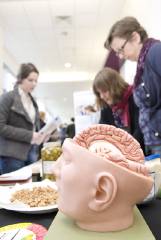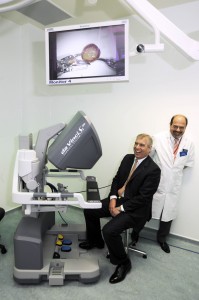On Wednesday May 15 we will be showcasing the pioneering research improving healthcare across Oxfordshire’s hospitals and across the NHS…and we hope you will join us. The National Institute for Health Research (NIHR) Oxford Biomedical Research Centre is a £100m collaboration between Oxford ... READ MORE
Chief Medical Officer opens new research facility for dementia, mental health and neuroscience in Oxford
Professor Dame Sally C. Davies, Chief Medical Officer and Chief Scientific Adviser at the Department of Health, today (21 March 2013) opened a new research facility in Oxford which will speed the development of effective treatments for dementia, mental health and neurological conditions. The ... READ MORE
Human liver kept alive outside the body
A donated human liver has been 'kept alive' outside a human being and then successfully transplanted into a patient in need of a new liver. So far the groundbreaking procedure has been performed on two patients on the liver transplant waiting list and both are making excellent ... READ MORE
Device keeps human liver alive outside body
World first: human liver kept alive and functioning on machine outside patient’s body World first: livers kept alive on device successfully transplanted into two patients Oxford University machine could as much as double number of livers for transplant Technology currently being trialled for ... READ MORE
Discover the a to zzzs of the brain
To celebrate Brain Awareness Week (March 11 to 15), researchers from the Oxford Sleep and Circadian Neuroscience Institute are hosting a series of activities, displays, talks on the subject of Sleep and the Brain. A crack team of neuroscientists will take over the Museum of the History of ... READ MORE
Amputee phantom pain linked to brain retaining picture of missing limb
Changes in the brain following amputation have been linked to pain arising from the missing limb, called ‘phantom pain’, in a study supported by the NIHR Oxford Biomedical Research Centre. Arm amputees experiencing the most phantom limb pain were found to maintain stronger representation of the ... READ MORE
WATCH: Public talk on the latest research tackling blood diseases like leukaemia
In this Oxford Biomedical Research Centre public talk, Senior Research Fellow Dr Adam Mead outlines the pioneering research within Oxford Biomedical Research Centre’s Blood theme and how it’s helping to tackle diseases including leukaemia. Research also covers lymphoma and other red blood cell ... READ MORE
New hope for those with Parkinson’s tremors
A NEW brain stimulation therapy could help supress tremors in people with Parkinson’s disease, according to new research. The non-invasive technique has been pioneered by researchers supported by the National Institute for Health Research (NIHR) Oxford Biomedical Research Centre, a collaboration ... READ MORE
New understanding of craniosynostosis will help families and treatment centres
RESEARCHERS in Oxford have discovered two new genetic causes of craniosynostosis - a rare bone condition that can inhibit brain growth in children. The work will give affected families much greater understanding of the condition and inform patient treatment plans. Andrew Wilkie, Nuffield ... READ MORE
Volunteers needed to investigate how exercise may improve the ageing brain
Research studies in Oxford are investigating how physical and mental exercise could prevent brain decline in older people. The Cognitive Health in Ageing project (CHA) is recruiting healthy volunteers aged 60 or over to provide valuable insights into how the brain can adapt and change during ... READ MORE
Diabetes screening could happen at home
Research led by the University of Oxford has found that people may be able to test themselves for diabetes in the comfort of their own home, using a novel electronic screening device. The device was trialled in both healthy volunteers and people with diabetes, both in the home and in the ... READ MORE
Cannabis pain relief is variable
The pain relief offered by cannabis varies greatly between individuals, a brain imaging study supported by Oxford Biomedical Research Centre suggests. The researchers found that an oral tablet of THC, the psychoactive ingredient in cannabis, tended to make the experience of pain more bearable, ... READ MORE
Remodelling the Brain: an insight into research that could aid stroke recovery
Our brains adapt whenever we learn a new skill, such as juggling and they also adapt after damage such as stroke. In this Oxford Biomedical Research Centre public talk, Professor of Cognitive Neuroscience Heidi Johansen-Berg shows how brain imaging allows us to watch the brain remodel, reorganise ... READ MORE
Royal visit to Oxford’s Churchill Hospital
The Duke of York visited the Churchill Hospital in Oxford today to mark the opening of the new building. The building, that includes an integrated Cancer and Haematology Centre, provides a base for many NIHR Oxford Biomedical Research Centre projects. Chairman of Oxford University Hospitals ... READ MORE
Video encourages patients to participate in diabetes trial
A new video from the Diabetes Trials Unit (DTU) at the Oxford Centre for Diabetes, Endocrinology and Metabolism (OCDEM) is being launched today, on World Diabetes Day. Produced with local film company Nice Tree Films and funding from the NIHR Biomedical Research Centre in Oxford, the video ... READ MORE
Unique imaging centre opens for research in emergency care
A new £13m research centre aims to improve the early treatment of heart attack and strokes by understanding more about what is happening in the patient’s heart or brain tissue at the time of the attack. The University of Oxford Acute Vascular Imaging Centre (AVIC) at the John Radcliffe Hospital ... READ MORE
New appointment to the National Research Ethics Advisors Panel for NRES (National Research Ethics Service)
Dr Mark Sheehan has been appointed to the National Research Ethics Advisors Panel. The National Research Ethics Service (NRES) was originally asked by the four UK Health Departments, through the United Kingdom Ethics Committee Authority (UKECA) to establish a central advisory panel. The objective of ... READ MORE
Genetic cause of insulin sensitivity offers diabetes clues
The first single gene cause of increased sensitivity to the hormone insulin has been discovered by a team of Oxford University researchers. The opposite condition – insulin resistance – is a common feature of type 2 diabetes, so finding this cause of insulin sensitivity could offer new ... READ MORE
High speed bench-top sequencing set to change the face of infection control
A study published today in BMJ Open, by researchers from Oxford, Leeds, Brighton and the Health Protection Agency, highlights the use of new bench-top DNA sequencers to quickly and cheaply unravel the entire genetic codes of bacteria causing life-threatening infections. This technology has the ... READ MORE
NHS set to benefit from UK-led technologies
Video games, pioneering gene therapies and new medical devices are set to transform treatments on the NHS, with support from the Department of Health and the Wellcome Trust. The experimental technologies are being developed through the Health Innovation Challenge Fund, which was set up in 2009 to ... READ MORE
- « Previous Page
- 1
- …
- 9
- 10
- 11
- 12
- 13
- …
- 17
- Next Page »



